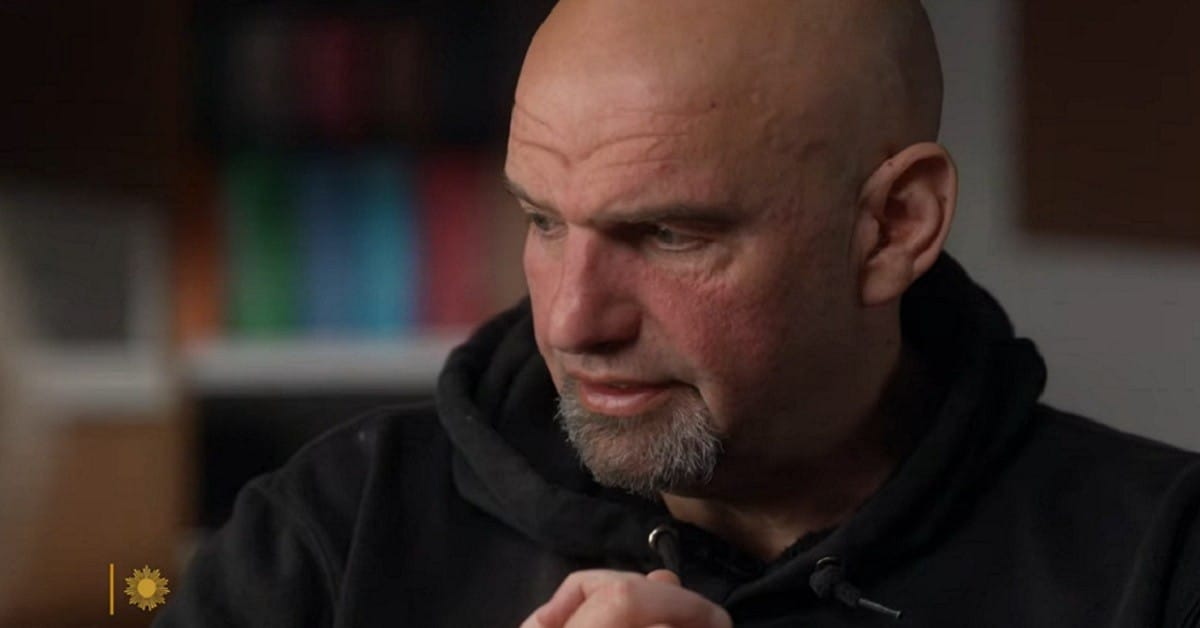OPINION: This article may contain commentary which reflects the author's opinion.
Sen. John Fetterman gave his first interview after being discharged after weeks-long treatment for clinical depression, and something about the Pennsylvania Democrat’s demeanor immediately became apparent to observers.
Fetterman sat down with CBS News over the weekend.
“In his first interview since leaving Walter Reed National Military Medical Center,” the Western Journal noted, “Fetterman’s inability to keep his eyes forward is an indication that he’s constantly reading from a captioning screen, translating interviewer Jane Pauley’s questions and possibly even cuing him on his own answers.”
It’s not clear that Fetterman is reading from anything, but he certainly appears to be averting his gaze toward his right side as if to be looking at something.
WATCH:
Six weeks after entering Walter Reed National Military Medical Center for inpatient treatment for depression, Sen. @JohnFetterman shares his struggle with depression, his health, and more in an intimate interview with Jane Pauley this "Sunday Morning." pic.twitter.com/3o2926I48B
— CBS Sunday Morning 🌞 (@CBSSunday) March 31, 2023
That said, in the weeks following his serious stroke about a year ago — and before the November election in which he defeated Trump-backed GOP nominee Dr. Mehmet Oz — Fetterman relied on closed captioning from a computer screen during an interview with MSNBC because he was unable to hear questions correctly.
“In small talk before the interview, without captioning, it wasn’t clear he was understanding our conversation,” NBC News correspondent Dasha Burns said to Lester Holt on “NBC Nightly News” report.
“I don’t think it’s going to have an impact,” the Democrat candidate said. “I feel like I’m gonna get better and better – every day. And by January, I’m going [to] be, you know, much better. And Dr. Oz is still going to be a fraud.”
He did, however, admit that the stroke has changed his life as he said that “everything about it is changed.”
“I sometimes will hear things in a way that’s not perfectly clear. So I use captioning so I’m able to see what you’re saying on the captioning,” the Democrat said.
“But it gets much, much better where I take in a lot,” he said. “But to be precise, I use captioning, so that’s really the maiming, excuse me, that’s the major challenge. And every now and then, I’ll miss a word. Every now and then. Or sometimes I’ll maybe mush two words together. But as long as I have captioning, I’m able to understand exactly what’s being asked.”
“We’ve asked for your medical records. We’ve asked to have a conversation with someone from your medical team, to interview your physician. You’ve declined those requests. Why?” the reporter asked.
“I feel like we have been very transparent in a lot of different ways,” Fetterman said. “When our doctor has already given a letter saying that I’m able to serve and to be running,” he said as the reporter noted that the letter came six months ago and said, “Don’t voters deserve to know your status now?”
NBC: "Can voters trust that you will be ready to do this job?"
Fetterman: "Yeah, of course," after reading the question off a giant MacBook that he needs to understand what is being said to him. pic.twitter.com/McBRfyd3R3
— Greg Price (@greg_price11) October 11, 2022
NBC: "We've asked for your medical records… you've declined. Why?"
Fetterman: "Our doctor has already given a record saying I'm ready to serve."
NBC: "That letter was six months ago. Don't voters deserve to know your status now?"
Fetterman: I do speeches and give interviews pic.twitter.com/5yDNvaeYdN
— Greg Price (@greg_price11) October 11, 2022
“As I said, being in front of thousands and thousands of people and having interviews and getting around all across Pennsylvania, that gives everybody– and the voters decide if they think that’s really the issue,” he said.
“And then I think there’s – you can’t be any more transparent than standing up on a stage with 3,000 people and having a speech without a teleprompter and just being – and putting everything and yourself out there like that. I think that’s as transparent as everyone in Pennsylvania can see,” he said.
He also talked about the movie “Shawshank Redemption” to defend his position on giving clemency to some convicted criminals.
“If you, at the end of the movie, you would vote to have Morgan Freeman’s character die in prison, then that’s really those – that’s the choice,” the candidate said. “I haven’t met a single person that’s said, ‘Yeah, Morgan Freeman should die in prison.’ It’s all a choice on redemption and giving somebody a chance to not die in prison that is no of any danger to the public whatsoever.”
Some observers, at the time, warned of Fetterman’s obvious mental and physical impairments.
“This is a rough clip for @JohnFetterman, will only fuel questions about his health,” author Jonathan Martin said.
